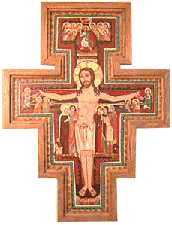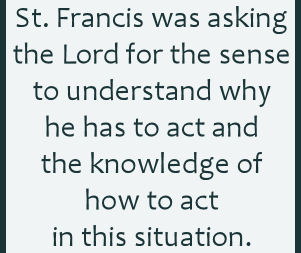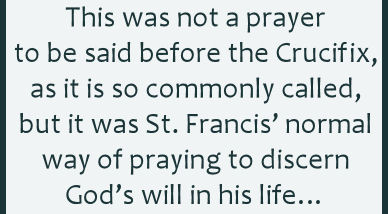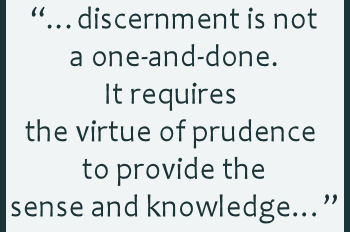|
Reflections by
Let us take a closer look at St. Francis of Assisi’s Prayer to Discern God’s Will Before the Crucifix.
Usually, this prayer is titled Prayer of St. Francis Said Before the Crucifix, and there is a line towards the end that is translated as “sense and knowledge.” I started to question just what might be St. Francis’ understanding in the use of these two concepts — sense and knowledge. Also, I was a bit confused because, frequently, I’ve seen this line translated as “wisdom and understanding.” I wondered what did St. Francis actually pray? I mentioned my confusion to Fr. Rick Martingetti, OFM, a Franciscan scholar who lived with us at the time; he went to get his books on St. Francis’ writings. Looking at the Italian copy of Francis it reads: “senno et cognoscemento” which doesn’t quite translate. The Latin text uses the phrase “sensum et cognitionem”,2 which translates as “sense and knowledge”.3 I wondered if by using “senno” St. Francis might have been thinking of praying for “common sense and understanding” which would add a different nuance to the prayer, at least in my understanding. Common sense is a lost gift and most mis-named; it is not that common after all. Could St. Francis be praying for the sense and knowledge to think through situations with discernment? Not long after, Fr. Paolo Benati, TOR, former TOR Secretary General, now Provincial of the Assisi Province, and moral theology scholar, came to visit Franciscan University. Before he left I asked Fr. Paolo just what did Francis say in Italian. He wrote back: “‘Senno’ is still an Italian word but has a slightly different meaning.…‘prima faciae” senno equals sense. Adjusting it to the use of the time, I should say that senno means ‘Why I should do something?’ “‘Cognoscimento’ does not exists any more. It is a typical 13th Century vulgare word, the common language spoken before Italian. The most similar Italian contemporary word It is ‘conoscenza’. Once again I will say that ‘cognoscimento’ means ‘How to do something?’”
This helps to understand that St. Francis is praying for the practical/common wisdom of what needs to be done and the knowledge of how best to accomplish that goal. How to think things through, to get through things. This prayer is really an expression of Francis of Assisi’s discernment throughout his life journey. Early in his life, Francis was discerning but not a discernment informed by the Spirit of the Lord, and yet the Lord was preparing him. It could be said that Francis’ conversion began with a wrestling to discern God’s will for his life. After his time of failed military service, imprisonment, convalescence and slow recovery, Francis is led to desire more strongly the will of God in his life. At the same time, he begins to be drawn to the countryside chapels that dominate the Italian landscape. It is said this prayer was prayed by Francis within the crumbling way-side chapel of San Damiano in Assisi.
This helps to understand that Francis’ usual manner of prayer is praying for practical, common sense of what needs to be done and the knowledge of how best to think through situations with prudence and discernment. This prayer is a prayer of discernment throughout our lives. Discernment didn’t end throughout the life of St. Francis, and it doesn’t end for us as well. We continue to ask God for discernment in this moment to follow what he is asking of us. Discernment can be a disturbing process; it is not always well-defined and comfortable. Francis of Assisi, himself, had an experience of failure when he was injured on the battlefield and realized that his aspirations of knighthood, his dream, would not come to be. This failure became a doorway in which he could discern the greater things God had in store for him. Pope Francis: in his “Catechesis On Discernment: 2. An example: Ignatius of Loyola”4 said:
Discernment, therefore, involves action. True discernment requires the virtue of prudence. The terms can be mostly inter-changeable. Prudence: entails a practical wisdom.5 The Catechism of the Catholic Church states: “Prudence is the virtue that disposes practical reason to discern our true good in every circumstance and to choose the right means of achieving it;…Prudence is ‘right reason in action,’ writes St. Thomas Aquinas, following Aristotle.” (CCC, no. 1806). How well prudence is developed will affect every aspect of our lives — be it, academics, athletics, family, dating relationships, vocation, careers, handling money, etc. Prudence is well-ordered reason applied to action, so that we not only know the right thing to do, but also how and when to do it. The prudent man or woman is one who does the good, as opposed to one who merely knows the good. St. Francis prayed for sense and knowledge, the common, practical sense to think things through in order to get through things. There are 3 key aspects of prudence involved in any discernment:
Let’s look at the 3rd aspect of prudence/discernment which involves decisiveness, putting our decision into action. No matter how much we seek counsel, weigh a decision, and make a judgment in our minds, if we fail to execute our decision, we do not have prudence. There are many reasons we do not carry out a decision well. Sometimes, after making a judgment about what to do, we hesitate, have second thoughts, and delay in execution. Maybe we fear failure or change. Or perhaps we become overwhelmed by the risk involved. In all these cases, our emotions take over and keep us from staying on the right path of a good decision. Sometimes we are simply indecisive, so we put off making decisions. In order to keep our options open, we avoid commitment in case something better might come along.
If I might add, sometimes discernment involves having options. Say you have a couple of job offers, or great opportunities and you keep praying for God to let you know which to choose because you don’t want to make a mistake. In this case, ask yourself which choice gives you greater passion. It’s like someone having three bowls of ice cream in front of them — vanilla, chocolate and butter pecan — and they don’t want to choose the wrong one. Suddenly, they hear God speak, “Will you hurry up! I made all of them and, by the way, they are melting! Which one do you prefer, make a choice.” You might ask in a prudent discernment which choice gives you passion? Remember, it just might be God who put that passion within you, now decide, choose and act!” But still we wonder, “Can we ever be completely positive that we have discerned accurately? Sometimes we cannot be certain. However, if we have asked God for His direction and prudently have tried to follow where God is leading, then we need to trust our decision making process.…Life in this world is one of continual discernment and refinement of action until we enter into eternity with God.”7 In closing, let us pray together for this “sense and knowledge” to do what the God is asking us to do today so that we are ready for what God will ask of us in the future.
Notes: 1. Saint Francis of Assisi,
“The Prayer before the Crucifix” (1205/06), Francis of Assisi –
the Early Documents, 40 8. Op. cit, Saint Francis of Assisi.
|


 Fr. Paolo concluded, “So according to my studies
and Italian literature background, I suggest you translate senno
and cognoscimento with something like ‘sense’ and
‘knowledge’.” St. Francis was asking the Lord for the sense to
understand why he has to act and the knowledge of how to act in this
situation.
Fr. Paolo concluded, “So according to my studies
and Italian literature background, I suggest you translate senno
and cognoscimento with something like ‘sense’ and
‘knowledge’.” St. Francis was asking the Lord for the sense to
understand why he has to act and the knowledge of how to act in this
situation.  Fr. Conrad Harkins, OFM, another Franciscan
scholar who taught at Franciscan for a number of years, adamantly
told me that this prayer was not a prayer to be said before the
Crucifix, as it is so commonly called, but it was St. Francis’
normal way of praying to discern God’s will in his life; often while
before the Crucifix, he would pray this prayer.
Fr. Conrad Harkins, OFM, another Franciscan
scholar who taught at Franciscan for a number of years, adamantly
told me that this prayer was not a prayer to be said before the
Crucifix, as it is so commonly called, but it was St. Francis’
normal way of praying to discern God’s will in his life; often while
before the Crucifix, he would pray this prayer. For me, I’ve found that “discernment is not a
one-and-done. It requires the
virtue of prudence to provide the
sense and knowledge, plus the grace and blessings, for what needs to
be done to get through things.”
For me, I’ve found that “discernment is not a
one-and-done. It requires the
virtue of prudence to provide the
sense and knowledge, plus the grace and blessings, for what needs to
be done to get through things.” Some Christians might even spiritualize their
indecisiveness, saying, “I just need more time to pray about it. God
has not yet shown me what to do.”
Although taking time to
prayerfully think through a decision is important, in some cases, a
person’s never-ending “discernment” process really is covering up a
hidden weakness: a lack of decisiveness and a fear of commitment.
Some Christians might even spiritualize their
indecisiveness, saying, “I just need more time to pray about it. God
has not yet shown me what to do.”
Although taking time to
prayerfully think through a decision is important, in some cases, a
person’s never-ending “discernment” process really is covering up a
hidden weakness: a lack of decisiveness and a fear of commitment.